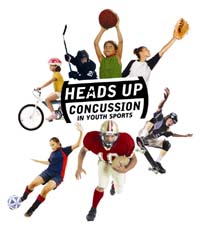BEFORE READING FURTHER...
 Answer the following questions from the CDC (Centers for Disease Control and Prevention) either TRUE or FALSE to test your knowledge of concussions:
Answer the following questions from the CDC (Centers for Disease Control and Prevention) either TRUE or FALSE to test your knowledge of concussions:
- A concussion is a brain injury
- Concussions can occur in any organized or unorganized recreational sport or activity
- You can't see a concussion and some athletes may not experience and/or report symptoms until hours or days after the injury
- Following a coach's rules for safety and the rules of the sport, practicing good sportsmanship at all times, and using the proper sports equipment are all ways that athletes can prevent a concussion
- Concussions can be caused by a fall or by a bump or blow to the head or body
- Concussions can happen even if the athlete hasn't been knocked out or lost consciousness
- Nausea, headaches, sensitivity to light or noise and difficulty concentrating are some of the symptoms of a concussion
- Athletes who have a concussion should not return to play until they are symptom-free and have received approval from a doctor or health care professional
- A repeat concussion that occurs before the brain recovers from the first can slow recovery or increase the likelihood of having long-term problems
When we hear about brain injuries, we are sometimes too quick to think of car accidents, strokes or even injuries sustained in war.
As parents, we don't necessarily think of sports concussions as being a brain injury, but it is – and although in most cases, not a traumatic one, they are serious.
Brain injuries can occur in any one, any age. They can stem from a simple 'ding' on the head to being directly hit during a car accident. They can occur from a fall, a stroke, and definitely from a variety of sports.
WHAT DO I NEED TO KNOW BEFORE THE SEASON BEGINS?
Because it’s sports season again, here are some tips for coaches, athletes and parents to know before the season gets into full swing.
- It is important that athletes have a baseline skills assessment prior to the start of a new sport and before the real chance of a concussions occurs. This allows families to follow-up after a concussion to track any changes in the athlete’s skills including memory, attention, reasoning and concentration.
- Make sure all practice and game equipment is in good shape and well-maintained throughout the season to help prevent injuries of any kind.
- Even the slightest of hits to the head or body can cause a concussion, so it's best to err on the side of caution when a child is knocked around. Don't be afraid to leave the field of play to let things settle and to decide if returning to play is in the best interest of the athlete and team. Remember, “It's better to miss one game than the whole season.”
WHAT WILL I SEE IF THERE IS A CONCUSSION?
Below are a few of the signs/symptoms that may be seen/reported following a concussion:
| Signs Seen | Symptoms Reported |
| *Appears dazed or confused | *Headache or 'pressure' in head |
| *Forgets sports plays | *Nausea or vomiting |
| *Moves clumsily | *Balance problems or dizziness |
| *Answers questions slowly | *Concentration or memory problems |
| *Behavior or personality changes | *Does not feel right; confused |
| *Loses consciousness (even briefly) | *Double or blurry vision; Feels groggy/sluggish |
To prevent long-term problems, keep the athlete off the field until the proper medical professional has cleared them for play, whether that's hours, days or weeks. Repeated concussions can cause long-lasting and even permanent damage to the brain which can result in learning difficulties, swelling of the brain and even death.
HOW WILL I KNOW AND WHAT DO I DO IF THERE IS DAMAGE TO THE BRAIN?
One way to minimize potential damage to the brain is to seek immediate medical attention. If it has been determined that brain damage has occurred, though, all hope is not lost!
Remember that pre-season cognitive assessment that you had done? Well, pull it out and when the doctor has cleared the athlete, go have another assessment done and compare the results.
Also, know that there is help out there in the form of cognitive skills training that can and is changing how the brain functions – whether it's from an early learning struggle or from a brain injury sustained during sports, a fall, a car accident, a stroke, etc...
While we are very pleased to be able to work with individuals who have sustained brain injuries, we are thrilled to see and hear about the changes our clients are experiencing in their memory, processing speed, etc...
WHAT DO I DO NOW?
For more information about scheduling a sports cognitive skills assessment, use the form below to send us your contact information:
|
